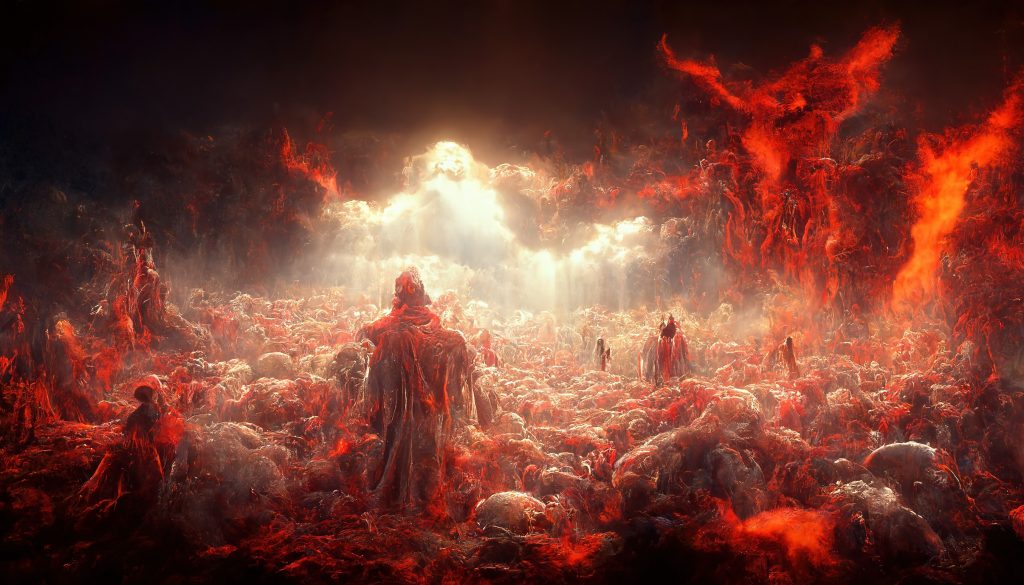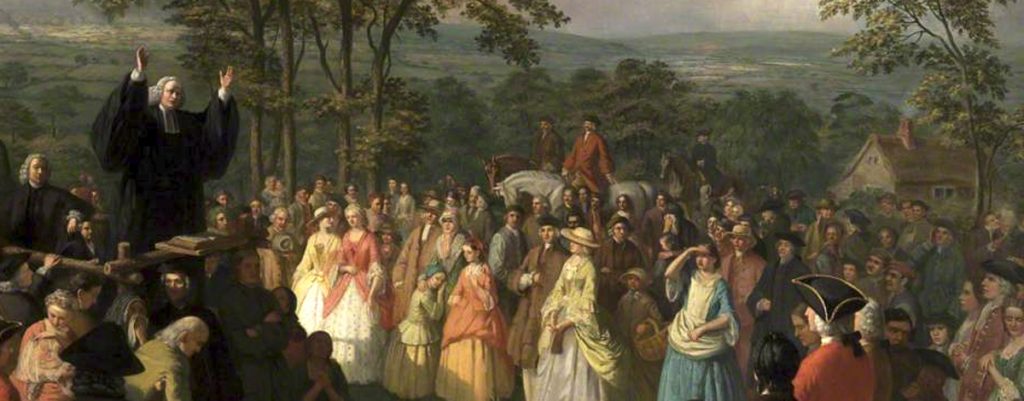“MAY THEY ROT IN HELL,” Donald Trump posted in all caps on Truth Social Christmas Day. “AGAIN, MERRY CHRISTMAS!”
Although this message was par for the course when it comes to Trump, it also offered a moment that caught many people off guard.
“What kind of sick person uses Christmas Day to rage and rant against his perceived enemies and to spread more lies and dissension?” BNG Executive Director Mark Wingfield asked in his final opinion piece of 2023. “What kind of Christian believes such a man is a fit leader?”
While the question could be taken as rhetorical, it’s actually a powerful invitation to consider how Christians might get emotionally stirred to promote someone who celebrates their non-Christian family, friends and neighbors rotting in hell.
Out of the abundance of the heart, the mouth speaks
Trump’s words on Christmas Day were made in the context of broader theologies of justice and humanity, as well as the affections these theologies produce. Of course, not even the most ardent Trump supporter would believe Trump is conscious of the theological assumptions of his post or even how theology moves our affections. But Trump’s ignorance does not remove him from participating in the ancient spirit of celebrating violent retribution against fellow humans.
Author/pollster Robert P. Jones called him out in October for using such language as “root out … the vermin,” “poisoning the blood of our country” and “the threat from within.” As Jones pointed out, when people told the Trump campaign the Nazis used these terms, a campaign spokesman replied by saying of those who would make such a connection, “Their entire existence will be crushed when President Trump returns to the White House.”
Talk about making the point for us.
“I fear that our rightful reticence to invoke an inappropriate Nazi analogy has rendered us incapable of calling out instances of actual Nazi ideology.”
As passionate as we all can be about politics, it can be tempting to roll the eyes when someone invokes the name of Hitler in political discourse. But Jones warned, “I fear that our rightful reticence to invoke an inappropriate Nazi analogy has rendered us incapable of calling out instances of actual Nazi ideology.”

Photo Wikimedia Commons
And when Trump himself responded in December to complaints about his use of the term “poisoning the blood” of America, he claimed, “I’ve never read Mein Kampf.”
Trump’s claim of never having read Mein Kampf may provide one of the rare occasions when we all believe him. But his ignorance and lack of reading do not absolve him from what he said. The truth is the words of Trump and the words of Hitler flow from the same heart of hierarchical purity and thirst for violence.
Going to heaven while loved ones go to hell
Many evangelicals would hear Trump’s words on Christmas Day and would agree he went over the top. But in light of evangelical theology, did he?
The ultimate Christmas Day for conservative evangelicals is the future day when Jesus is supposed to return to take them to heaven. In his book, The Reason for God: Belief in an Age of Skepticism, Tim Keller promised, “Everything sad is going to come untrue and it will somehow be greater for having once been broken and lost.” Worship songs echo, “What a day, glorious day that will be!”
But if that happens someday for them, the elephant in heaven’s throne room will be what Jesus is doing to their nonevangelical family and friends.
While some evangelicals believe Jesus will simply annihilate nonevangelicals, most believe Jesus will send them to eternal conscious torment. Many evangelicals take the apocalyptic language of the Bible literally, scaring kids by talking about a place where worms will be crawling through their skin as they weep, wale, gnash their teeth and swim around in pitch-black fire and brimstone for eternity. Others who affirm eternal conscious torment shrink back from such language due to how violent it seems.
But Keller doubled down on it. He said, “To say that the Scriptural image of hell-fire is not wholly literal is of no comfort whatsoever. The reality will be far worse than the image.”
In The Thrill of Orthodoxy, Trevin Wax agreed: “Jesus reached for the most awful picture language imaginable to convey a reality even worse than the images he used to describe it.”
If that turns out to be justice for nonevangelicals, how will everything sad come untrue, or every tear be wiped away for evangelicals, knowing what’s going down for their friends and family?
When I was an independent fundamental Baptist, we believed God would wipe away our memory so that we would forget they ever existed. But if you lived forever without knowing your child or spouse or parent or billions of your neighbors on earth ever existed, how would you be any resemblance of who you are? That reality would be dehumanizing, not only for the ones being tormented, but for the ignorant in heaven.
Some streams of Christianity have seen their neighbors’ torments in hell not as something to lament, but as cause to rejoice.
The other alternative, however, is far darker. In Keller’s framing, it would be sad to refuse to consider such a reality. In Trump’s words, it’s the same spirit that equates “Merry Christmas” with people rotting in hell. And to Wingfield’s question, it’s a spirit that encompasses far more Christians than Trump supporters, and goes back much farther in time than 21st century politics.
What there excites my admiration?
Conservative evangelical Calvinists often claim their beliefs have been the beliefs of Christians for 2,000 years. And while that is a naive claim in light of how theology has evolved over time, it carries some truth regarding how some streams of Christianity have seen their neighbors’ torments in hell not as something to lament, but as cause to rejoice.
As early as the second century, the church father Tertullian wrote in De Spectaculus: “How vast a spectacle then bursts upon the eye! What there excites my admiration?”
Then he spoke of the monarchs and governors who once persecuted Christians but were now themselves in hell, “tossing in the fiery billows,” and concluded: “I shall not care to attend to such ministers of sin, in my eager wish rather to fix a gaze insatiable on those whose fury vented itself against the Lord.”

123rf.com
In other words, “They’re rotting in hell! Merry Christmas to me!”
Is ignorance bliss?
Over the next two millennia, one of the lesser-known debates of the church has been whether those in heaven and those in hell know about or get to see one another.
Today’s conservative evangelical Calvinists often point back to Augustine as one of their most foundational theologians. In his fifth century work, The City of God, Augustine said those in heaven will “know what is going on outside in the outer darkness,” but that the wicked “shall not know what is going on within the joy of the Lord.”
In our vernacular, evangelicals would know what’s happening to nonevangelicals in hell, but nonevangelicals in hell wouldn’t know what’s happening in heaven.
Let me see!
But knowing and seeing are two different things. And in the 13th century, Thomas Aquinas wanted to make sure Christians could go so far as to see the wicked burning as part of their blessing.
In his work The Summa Theologica, Aquinas argued: “Nothing should be denied the blessed that belongs to the perfection of their beatitude. … Wherefore in order that the happiness of the saints may be more delightful to them and that they may render more copious thanks to God for it, they are allowed to see perfectly the sufferings of the damned. … That the saints may enjoy their beatitude more thoroughly, and give more abundant thanks for it to God, a perfect sight of the punishment of the damned is granted them.”
And how will Christians be emotionally affected by this sight?
Aquinas answers: “Whoever pities another shares somewhat in his unhappiness. But the blessed cannot share in any unhappiness. Therefore, they do not pity the afflictions of the damned.”
Making it personal
One might understand how Tertullian celebrated the demise of the oppressors at the top of society’s power structures. And perhaps it’s natural to categorize a generic people as “wicked” and then wash your hands of whatever happens to them. But what if this trajectory from the oppressors to the generically wicked continued to include the ones who mean the most to us, our family and friends?
Jeremy Taylor, the 17th century bishop of the Church of England, personalized hell in his work Holy Living and Holy Dying. “Husbands shall see their wives, parents shall see their children tormented before their eyes,” he said. “The bodies of the damned shall be crowded together in hell like grapes in a winepress, which press on another till they burst.”
Or consider the words of Nathaniel Emmons, who was a Congregational pastor at the turn of the 19th century: “The happiness of the elect will consist in part of witnessing the torments of the damned in hell, among whom may be their own children, parents, husbands, wives and friends; … but instead of taking the part of their miserable being, they will say ‘Amen!’, ‘Hallelujah!’, ‘Praise the Lord!’”
Losing our humanity
If you were to see your most ardent political opponents writhing in flames on the side of the road, how long could you watch them burn? After how many years would you begin to have pity on them?
If you were to see a stranger on fire, how long could you watch? And what emotions would you feel?
If you were to see a stranger on fire, how long could you watch? And what emotions would you feel?
Now imagine if it were your father, mother, brother, sister, son, daughter, close friend or coworker. How long could you watch them burn? How long could you hear them scream? And what would you feel?
The famous 18th century preacher Jonathan Edwards wrote in The Eternity of Hell Torments: “Every time they look upon the damned, it will excite in them a lively and admiring sense of the grace of God. … The view of the misery of the damned will double the ardor of the love and gratitude of the saints in heaven.”
Then in The End of the Wicked Contemplated by the Righteous, Edwards added: “When they (the saints in heaven) shall see the smoke of their torment (the damned), and the raging of the flames of their burning, and hear their dolorous shrieks and cries, and consider that they in the meantime are in the most blissful state, and shall surely be in it to all eternity; how will they rejoice!”

Jonathan Edwards and George Whitfield preaching hell-fire and brimstone during the First Great Awakening.
How could this be possible? How could you go from the response you would have now to rejoicing and doubling your love for and gratitude to God at the sight of your loved ones writhing in flames and at the sound of their shrieks and cries? Because then you’ll be more like Jesus?
The amount of humanity you have left in you now is directly proportionate to how willing you are to admit you would have lost your humanity in that scenario.
The dehumanizing power dynamics of glory hierarchies
But the conservative evangelical Calvinists today who follow this tradition deny feeling such emotions is evidence of being dehumanized. Instead, they believe they are being theologically motivated by defining reality through the framework of a glory hierarchy whose only proper responses are gratitude and submission.
John Piper explains: “He gets glory because his grace and mercy shine more brightly against the darker backdrop of sin and judgment and wrath, and our worship and our experience of that grace intensifies and deepens because we see we don’t deserve to be where we are.”
In his book Captive to Glory, Piper quotes Edwards saying: “The saints are … called upon to rejoice … in seeing the love and tenderness of God towards them, manifested in his severity towards their enemies.”
Why?
Because to Edwards, “God glorifies himself in the eternal damnation of the ungodly men. God glorifies himself in all that he doth; but he glorifies himself principally in his eternal disposal of his intelligent creatures: some are appointed to everlasting life, and others left to everlasting death.”
Dehumanizing ethics are the direct result of dehumanizing theology. You cannot simply hold to evangelical theology without the consequences of being shaped by it.
Explicit Christian nationalism vs. stoking the fires
Wingfield says one thing that must happen in 2024 is “Donald Trump must be defeated.”
In order to do this, we have to deconstruct Trump’s evangelical support by exposing the explicit embrace of Christian nationalism that is widespread in our nation today. But we also have to acknowledge how centuries of Christian theology stoke the fires for Trump’s celebration of people rotting in hell.
 One recent book that helps us recognize evangelicalism’s explicit support for Christian nationalism is Jon Ward’s Testimony: Inside the Evangelical Movement That Failed a Generation.
One recent book that helps us recognize evangelicalism’s explicit support for Christian nationalism is Jon Ward’s Testimony: Inside the Evangelical Movement That Failed a Generation.
One of the problems with Ward’s book is how positively he seems to present conservative evangelicals like John Piper. He says Piper was “one of the few speakers who did speak out with some vigor against Trump.” Elsewhere, Ward talks about the New Calvinists with the Together for the Gospel conference that was run mostly by men who lead The Gospel Coalition now. Ward said, “Politics and local affairs were not a big focus. They often said that all they wanted to do was ‘preach the gospel’ and leave the rest to God.”
While it is true the new Calvinists like Piper, The Gospel Coalition and even Keller have attempted to be nonpolitical while occasionally speaking out against Trump, it is vital that we recognize how these men lay the theological groundwork for justice that shapes the affections of evangelicalism as a whole toward celebrating violent retribution.
Piper and company may not light the match of Christian nationalism. But they pour gasoline ahead of time on the wood, hay and stubble of American evangelicalism by promoting theologies of glory hierarchies that dehumanize everyone into rejoicing over their loved ones rotting in hell. Like Trump and Hitler, it is a glory hierarchy that prioritizes blood purity and climaxes with blood punishment.
So, to answer Wingfield’s question: “What kind of Christian believes such a man is a fit leader?”
Any Christian who follows leaders that believe in the conservative Calvinist teaching of God caring primarily about self-glory and in the basic broader evangelical teaching of eternal conscious torment. They will at some point exchange their humanity either for ignorance or violent delights.
Rick Pidcock is a 2004 graduate of Bob Jones University, with a Bachelor of Arts degree in Bible. He’s a freelance writer based in South Carolina and a former Clemons Fellow with BNG. He completed a Master of Arts degree in worship from Northern Seminary. He is a stay-at-home father of five children and produces music under the artist name Provoke Wonder. Follow his blog at www.rickpidcock.com.
Related articles:
Trump, ‘law and order,’ and evangelical hypocrisy
Support for Trump is cultural more than theological, author says


